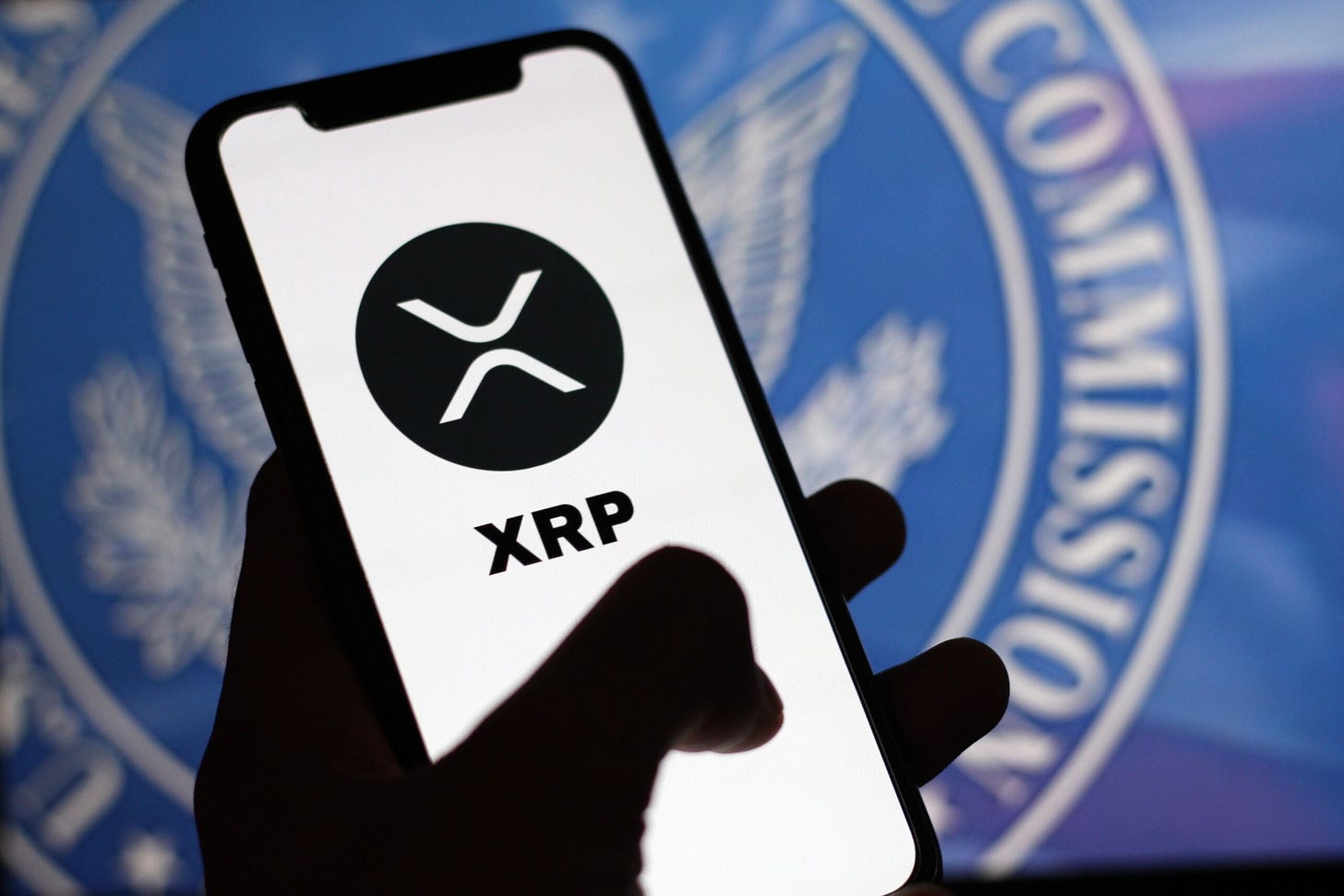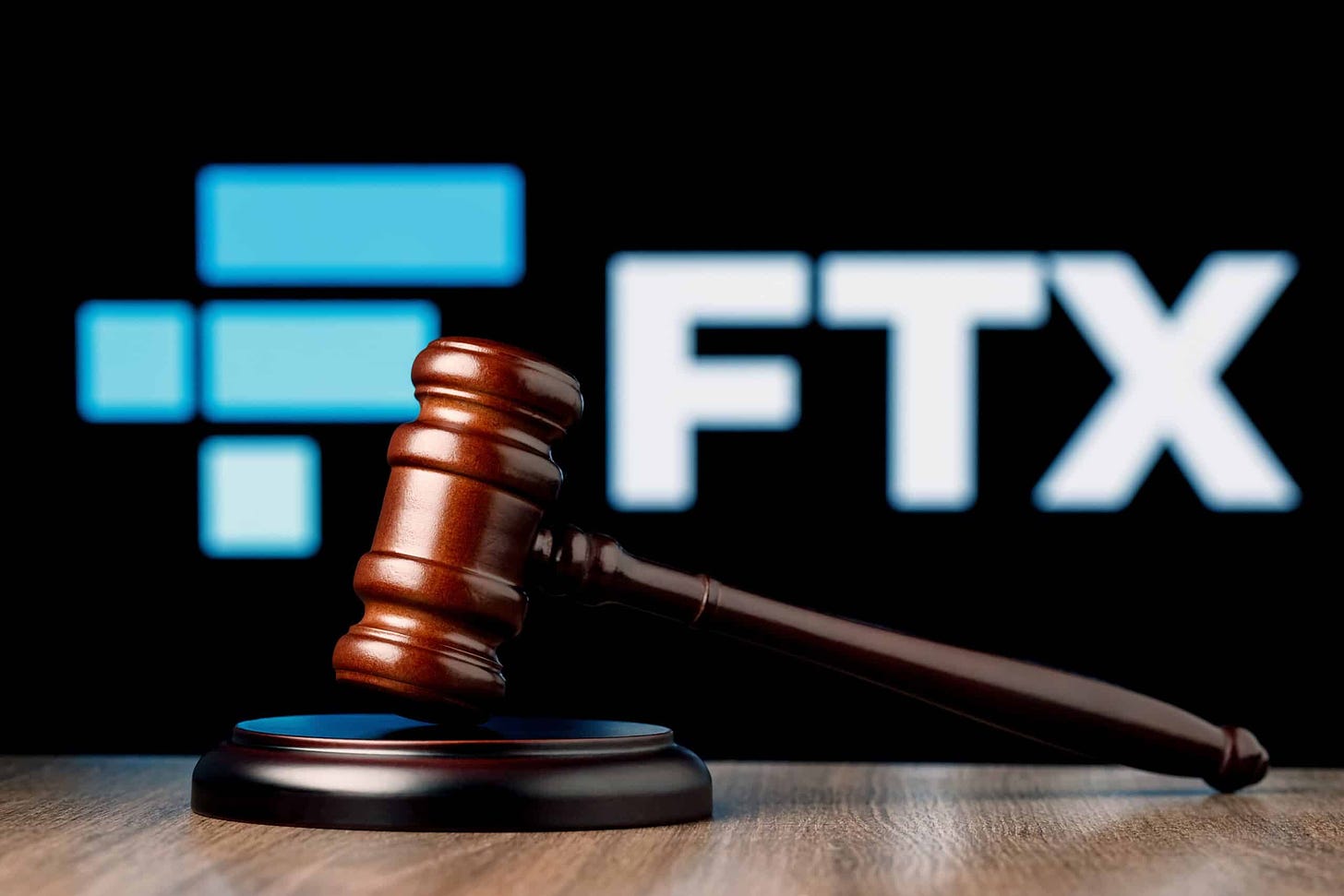Why Crypto Markets Rebounded and What Lies Ahead 🚀
Weekly News Recap: ⚖️ Ripple fined $125M, 💸 FTX creditors get $12.7B, 🏛️ SEC battles Coinbase, and more!
You are reading the Unchained Weekly newsletter, where we cover all the major news in the crypto space, providing insights into the market's latest trends, regulatory shifts, and technological advancements. Stay informed with your no-hype resource for all things crypto.
If you like Unchained: Refer us with a friend and earn a Premium subscription!
How Crypto Markets Are Reacting Post-Selloff, With Election/Fed Uncertainty Ahead
Jason Pagoulatos, head of markets at Delphi Digital, explains why crypto markets rebounded quickly from the rout this week, why ETH has underperformed BTC and SOL in 2024, and how Fed and election uncertainty might affect crypto.
After the unwinding of the Japan carry trade, the weak jobs report, and Jump’s dumping of ETH slammed crypto prices earlier this week, Jason Pagoulatos, head of markets at Delphi Digital, gives his insights on where prices are headed. He explains why he thinks Ethereum has underperformed so far in 2024, how the ETH ETFs might impact the price as outflows from Grayscale’s ETHE dwindle, and how the election, moves by the Fed, and the adoption of Bitcoin ETFs by Morgan Stanley advisors will affect BTC.
Listen to the episode on Apple Podcasts, Spotify, Pods, Fountain, Podcast Addict, Pocket Casts, Amazon Music, or on your favorite podcast platform.
Weekly News Recap
Ripple Fined $125 Million Amid Legal Battle With SEC
Ripple has been fined $125 million in its ongoing litigation with the U.S. Securities and Exchange Commission (SEC), which accused Ripple of raising $1.3 billion through the sale of its token XRP, alleging XRP was an unregistered security. Judge Analisa Torres ruled that while Ripple's institutional sales violated securities laws, its programmatic sales did not.
Following the news, XRP was up more than 20%.
The court's decision granted in part and denied in part the SEC's motion for remedies, imposing a fine significantly lower than the SEC’s proposed $2 billion. Ripple CEO Brad Garlinghouse praised the ruling, seeing it as a victory for Ripple and the broader crypto industry.
Additionally, Judge Torres issued an injunction preventing Ripple from future securities law violations. The SEC is expected to appeal the ruling, emphasizing the seriousness of Ripple’s violations.
FTX Creditors to Receive $12.7 Billion from CFTC Settlement
A U.S. District Judge has approved a settlement between FTX, Alameda Research, and the Commodity Futures Trading Commission (CFTC), resulting in $12.7 billion being distributed to FTX creditors. The agreement, approved by Judge Peter Castel, concludes a 20-month lawsuit by the CFTC.
FTX and Alameda will pay $8.7 billion in restitution and $4 billion in disgorgement. Notably, the CFTC did not seek additional civil penalties, allowing the entire sum to go to creditors, primarily retail investors.
Additionally, the settlement permanently bans FTX and Alameda from trading digital assets and operating as market makers or custodians. This follows FTX's earlier agreement to pay $885 million to the IRS, resolving another dispute. Creditors have until August 16 to choose their preferred payment method.
Lawmakers Push for Ban on Election Betting; SEC Battles Coinbase Over Discovery Requests
On Monday, Senator Elizabeth Warren, alongside several Democratic lawmakers, urged the U.S. Commodity Futures Trading Commission (CFTC) to finalize a proposed rule that would ban event contracts that allow bets on political outcomes. In a letter to CFTC Chair Rostin Behnam, the lawmakers argued that such bets undermine the integrity of the democratic process by turning political decisions into financial calculations. They expressed concern that allowing substantial financial wagers on elections could erode public trust, especially if wealthy individuals and political insiders exploit non-public information for financial gain. The CFTC had voted in May to propose this rule, which also seeks to prohibit betting on other sensitive events such as terroris acts and war.
Meanwhile, the legal battle between the SEC and Coinbase has intensified. The SEC has criticized Coinbase's broad discovery requests as part of its defense against allegations that it operated as an unregistered securities broker. Coinbase is seeking extensive internal communications from the SEC, including personal communications from SEC Chair Gary Gensler, to argue that the SEC's regulatory stance on digital assets has been inconsistent. The SEC's lawyers contend that these requests are overly broad and irrelevant to the case, aiming to put the regulator itself on trial. Despite a judge ruling that some requests are inappropriate, Coinbase continues to seek documents to demonstrate the SEC's varying interpretations of securities laws as they apply to digital assets.
In related news, the digital assets industry’s Fairshake PAC claimed another victory, as its spending helped defeat Rep. Cori Bush in the Missouri primary, marking the third win this week against candidates supported by Sen. Elizabeth Warren.
Ethereum Complies With Tornado Cash Sanctions, NY Fed Report Finds
A new report from the Federal Reserve Bank of New York indicates that Ethereum entities such as block builders and validators have largely adhered to sanctions imposed on Tornado Cash. Despite some ongoing activity, the majority of block validators have complied with the U.S. Treasury Department's restrictions.
The sanctions, initiated by the Office of Foreign Assets Control (OFAC) in August 2022, targeted Tornado Cash due to its use in illicit activities like money laundering. The report highlights that while the total transaction volume involving Tornado Cash has decreased significantly, some transactions continue, suggesting only partial compliance.
Notably, the report found that block validators directly downstream of transactions tend to comply with sanctions, particularly after a court ruling in favor of OFAC in August 2023. However, nodes further removed from the transaction origin are less likely to cooperate.
The paper emphasizes that sanctions have led to a sharp decline in Tornado Cash's transaction volume and user diversity, although the service remains viable as a privacy tool.
Ronin Bridge Paused and Restarted After $11.8 Million Whitehat Hack
Ronin, a prominent crypto bridging service, was paused on Tuesday after a whitehat hack drained $11.8 million worth of tokens. The breach involved 4,000 ETH (worth $9.8 million), as well as $2 million in USDC. The Ronin Network quickly paused the bridge approximately 40 minutes after detecting the exploit.
The Ronin team confirmed that the bridge, which secures over $850 million in assets, remains safe. The exploit was attributed to an issue introduced during a bridge upgrade. The team is now working on a solution and plans to conduct intensive audits before deploying a new upgrade.
Negotiations with the whitehat hackers led to the return of the stolen funds. The hackers will receive a $500,000 bounty for their ethical actions. Ronin co-founder Aleksander Larsen reassured users that their funds are secure and any shortfalls will be re-deposited when the bridge reopens. This incident follows a significant hack in 2022 when Ronin lost over $600 million.

Also, blockchain protocol Nexera suffered a $1.8 million exploit, causing its NXRA token to tumble 40%, with the attacker linked to recent compromised private key incidents including the OKX DEX hack.
Trump-Related Memecoin Crashes 90% in Alleged Rugpull by Developer
The controversial Donald J. Trump ($DJT) memecoin plummeted by nearly 90% after a developer-linked wallet sold off $2 million worth of tokens. The transaction saw 2 billion DJT tokens, constituting 2% of the total supply, dumped in one go, causing the token’s market cap to drop from $55 million to $2 million in mere minutes.
Former pharmaceutical executive Martin Shkreli, who had claimed involvement with the token, blamed Trump’s son, Barron Trump, for the sell-off, suggesting that the younger Trump had carried out a rugpull. Despite earlier speculation fueled by social media, neither Donald Trump nor Barron were officially linked to the coin.
The memecoin, launched in June, initially surged by 400% on rumors that the former president would endorse the coin.
Genesis Completes Restructuring, Begins $4 Billion Distribution
Genesis Global has finalized its restructuring and started distributing $4 billion in assets to creditors after declaring bankruptcy in January 2023. Creditors are expected to recover an average of 64% of their cryptocurrency holdings. Bitcoin creditors will get back 51%, Ethereum creditors 65%, and Solana creditors 29%. Stablecoin and USD creditors will be fully reimbursed.
The company, which owed $3 billion to its top 50 creditors, including Gemini and VanEck, has also set up a $70 million litigation fund to pursue claims against third parties, such as its parent company Digital Currency Group. Further recoveries may occur based on ongoing claims and litigation outcomes.

Franklin Templeton Expands Tokenized Money Market Fund to Arbitrum
Franklin Templeton, a $1.5 trillion asset manager, has expanded its OnChain U.S. Government Money Market Fund (FOBXX) to the Arbitrum blockchain, a layer 2 network on Ethereum. Previously available on Stellar and Polygon, this marks the third blockchain on which the $420 million fund's shares can be traded.
The expansion to Arbitrum aims to integrate decentralized finance with traditional finance, offering new opportunities for institutional investors. "Expanding into the Arbitrum ecosystem is an important step on our journey to empower our asset management capabilities with blockchain technology," said Roger Bayston, Franklin Templeton's head of digital assets. The fund, launched in 2021, was the first to use a public blockchain for recording transactions and ownership.








